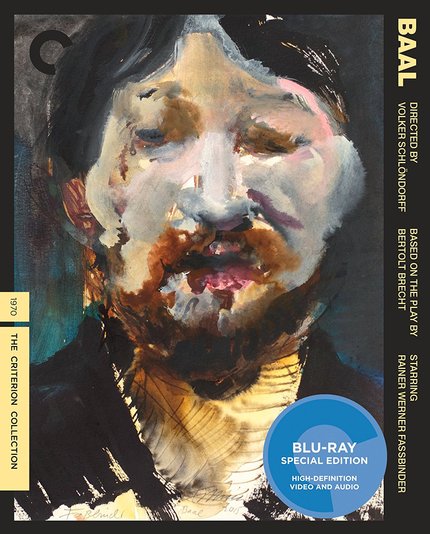Blu-ray Review: BAAL, The Savagery Of The Tortured & Torturing Artist

Prior to receiving this Blu-ray in the mail I had never seen Baal, I only knew Volker Schlondorff from The Tin Drum, and I had only seen a tiny fraction of Fassbinder's work, but it was the idea of the two working together than drew me the piece, and I'm glad it did.
Baal is based on a play by early twentieth century writer Bertolt Brecht, who I also only knew by reputation, and even though the original work was written in 1918, its themes remain relevant. Baal is a destructive genius, a poet who despises the bourgeoisie and all of the trappings of the upper middle class in which his talent threatens to place him. He instead insists upon tromping through a world of drunks and degenerates and, being one himself, attempts to bring others along for the ride. In the process he taunts, uses, abuses, and humiliates others, seemingly for fun. However, there's a vulnerable humanity beneath his abrasive exterior that is in a desperate search for something deeper, he just goes about it all wrong.
At the time that Schlondorff and Fassbinder were making Baal, neither was the huge name they'd become on the international scene. Schlondorff had made Young Torless in '66, which was received positively, and Fassbinder was just beginning his storied career in film, having already shot and released his first couple of films the previous year. The two auteurs together made for a potent aphrodisiac to art film fans of the German New Wave, creating a propulsive, impulsive, animalistic work of lo-fi genius.
The film is very sternly constructed. 24 scenes, each numbered on screen, each featuring Fassbinder's Baal careening through life, frequently bowling over and through everyone and everything around him in an effort to maintain a sense of danger and unpredictability. Only on the odd occasion does he deign to express a desire for emotional connection at all, and when that does happen, it doesn't work out well for him.
Self-destructive artistic geniuses are a dime a dozen in literature and cinema, but very few were able to translate their own tortured existences to the screen the way Fassbinder did, making Baal simultaneously an outward and inward portrait of an artist barreling toward oblivion.
The Disc:
Baal was never going to be reference material for high end home theatres, but The Criterion Collection does manage to wring as much as possible from the source material. Shot on 16mm film, the feature looks dingy throughout. The color palette is mostly pretty lifeless, and fine detail is almost non-existent, however, I suspect there's only so much that could've been done in those cases. The Mono audio track is similarly unexpressive, but also doesn't appear to have much damage to speak of. If you're looking for an audio/visual revelation, you might be disappointed, but the film holds up nicely even if it isn't exactly a beauty.
The Criterion Collection has stacked this release with bonus materials that are incredibly helpful in contextualizing the film. We get a pair of extended interviews with director Schlondorff, one from the film's initial TV screening, and another from 2015, both of which include lots of insight into the film, its production history, and its importance in the careers of its cast and crew. There is also a filmed discussion between Ethan Hawke and playwright Jonathan Marc Sherman, who staged a modernized version of Baal, in which the pair talk about their connection to the work and the timeless nature of the character. We also get interviews with actress Margarethe von Trotta, who worked with Fassbinder on numerous occasions, and historian Eric Rentschler.
Rounding out the package is an essay from critic Dennis Lim, who mostly discusses production details and overall themes, helping to put the film in context in the careers of both its star and director. It's an interesting read that fills in some of the gaps left by the filmed supplements.
Baal is certainly not for everyone. Plot, story, and sympathetic character portrayals are not elements that either Schlondorff or Fassbinder were particularly concerned with. However, experimental film fans will likely find themselves thinking about the film and Fassbinder's performance longer after the film ends.







